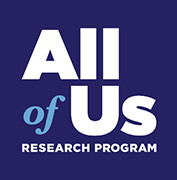
The NIH launched All of Us in 2018 to help build one of the most diverse health databases in history and advance individualized disease prevention, treatment and care for people of all backgrounds.
The All of Us research program has opened the researcher workbench platform for investigators at select institutions including Emory University. Researchers will now be able to use individual-level data of All of Us participants as part of a beta testing phase. The program is funded by the National Institutes of Health (NIH).
Associate vice president for research at Emory’s Woodruff Health Sciences Center, Michael Zwick, who leads Emory’s All of Us program says, “Emory is proud of its role in this program, and is helping to build what promises to become one of the world’s largest and most diverse datasets to advance precision medicine research.”
The beta version will enable researchers to begin exploring the program’s initial dataset and tools for use in a wide range of analyses. The current version of the workbench has data from nearly 225,000 participants nationwide, including electronic health record and participant-reported information.
Emory has signed a data use agreement with the All of Us Data and Research Center, so all Emory faculty, staff, and students with eRA Commons accounts may apply for access to this resource, at https://www.researchallofus.org/apply/.
Requirements at this time include, in addition to having an eRA commons account, completion of the All of Us Responsible Conduct of Research Training, and commitment to a Data User Code of Conduct.
Some facts about the data available at the researcher workbench:
- This is an early version of the data that will grow richer over time.
- It currently includes an initial set of demographic information and data from surveys and electronic health records.
- New data will be added regularly.
- Over time, the study will add data from genomic analysis, biomarkers, etc. These data are not available at this time.
- Initially, researchers will have to code in R or Python to analyze the data in a Jupyter Notebooks environment, but the study will add more tools over time.
Though not required, researchers who access the workbench should notify Dr. Zwick at mzwick@emory.edu, and co-investigator Dr. Alvaro Alonso at alvaro.alonso@emory.edu, and provide a brief description of their research project. This information will help track use of this resource and its impact.
All of Us and COVID-19
The program is using the database for researching the new coronavirus through a variety of ways: studying recent blood samples for antibodies, sending surveys to all participants, and through information in participants’ electronic health records (EHR). With the virus affecting people differently, EHR information may help explain why some people have certain symptoms and others don’t. Privacy remains a top priority and any identifying information will be removed before researchers can use the data. At Emory, Dr. Alonso says researchers hope to use the data to investigate the long-term impact of COVID-19 on other diseases such as heart and lung disorders.
About All of Us
The NIH launched All of Us in 2018 to help build one of the most diverse health databases in history and advance individualized disease prevention, treatment and care for people of all backgrounds. The program aims to enroll more than a million people across the United States.
Emory University, which is part of the SouthEast Enrollment Center (SEEC) of All of Us, has now enrolled more than 18,800 participants since the launch. The Emory section of the research is being conducted at clinical locations throughout Emory Healthcare – cardiology and orthopedics clinics in Executive Park, Emory Midtown Hospital, Emory Decatur Hospital, Emory Hillandale Hospital, outpatient clinics at Emory University Hospital, and at the Wesley Woods Health Center. In addition to Emory the SEEC network includes Morehouse School of Medicine, the University of Miami Miller School of Medicine, and the OneFlorida Clinical Research Consortium led by the University of Florida.
People ages 18 and older, regardless of health status, can enroll. The aim of All of Us is to involve individuals from all communities, including those who have been underrepresented in other research studies, to make the program the largest, most inclusive resource of its kind.
